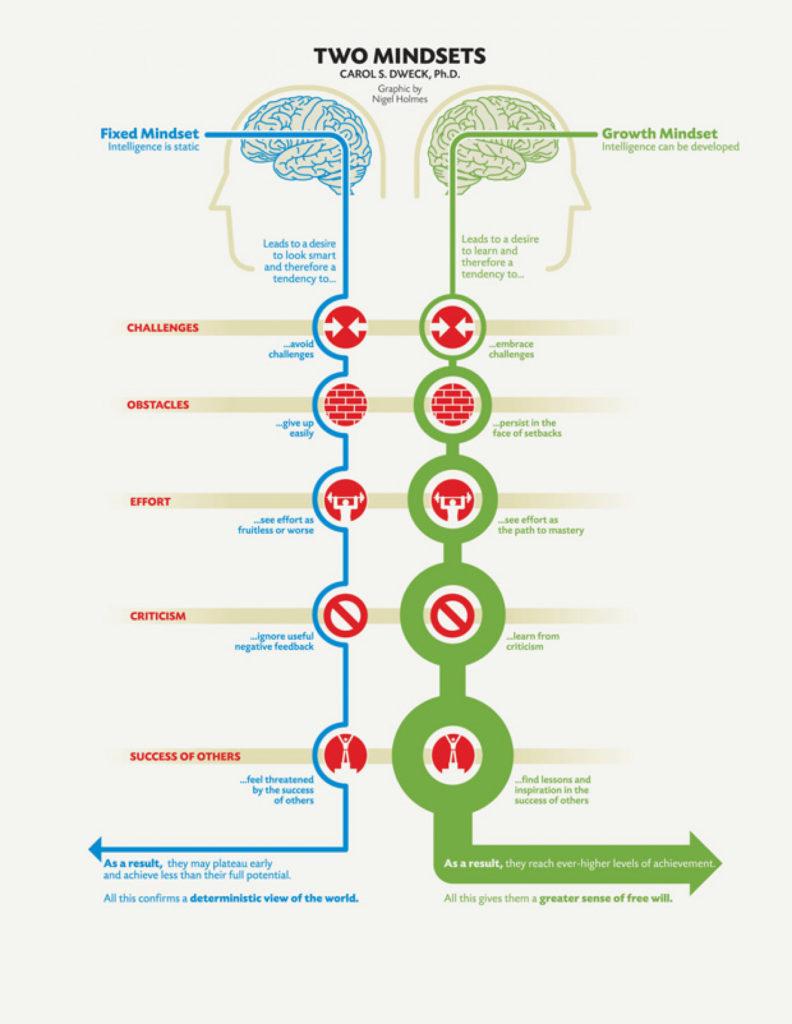We all have beliefs about our abilities and potential. These beliefs are part of our mindset, which is so powerful that it can influence our behaviour and predict our success. Mindset shapes our everyday lives, helping us interpret our experiences and future possibilities.
Carol Dweck, PhD is a Stanford Professor of Psychology and one of the world’s leading authorities on the science of motivation. She has spent years researching why people succeed (or don’t) and what’s within our control to foster success.
In her excellent book Mindset (check out the notes) she tells us that we can live with either “Growth” mindset or a “Fixed” mindset.
Growth mindset occurs when we believe our intelligence and abilities can be improved upon with effort and the right strategies. And this type of mindset is strongly linked to greater happiness and achievement in life.
Dr Dweck writes:
In this mindset, the hand you’re dealt is just the starting point for development. The growth mindset is based on the belief that your basic qualities are things you can cultivate through your efforts. Although people may differ in every which way—in their initial talents and aptitudes, interests, or temperaments—everyone can change and grow through application and experience.
Alternatively, those people with a fixed mindset believe their intelligence and abilities are “fixed” and can’t be changed in a meaningful way. When locked in a fixed mindset, we may fear new experiences, avoid risks, and feel the need to prove ourselves over and over. We see mistakes as failures rather than opportunities to grow and learn. Basically, you do everything you can to avoid looking bad.
As Dr Dweck tells us:
Believing that your qualities are carved in stone—the fixed mindset—creates an urgency to prove yourself over and over. If you have only a certain amount of intelligence, a certain personality, and a certain moral character—well, then you’d better prove that you have a healthy dose of them. It simply wouldn’t do to look or feel deficient in these most basic characteristics.
Here is a quick visual to help you understand the difference between the mindsets:

Why should you cultivate Growth mindset and help your child develop it from early childhood?
As you can guess, it is worth to cultivate Growth mindset throughout your life if you want to succeed and live a happy life. And it’s never too late to start changing your mindset.
Parents across the globe are adopting the growth mindset concept as well. We are not an exception ☺ and here is why.
Developing the right mindset from early years is crucial for a happy (and truly epic) life. When children learn that putting the constant effort and using the right strategies can make them smarter, they would try harder and achieve more. When they perceive mistakes and failures as opportunities for growth, nothing will stop them on the way to success. When they know their brains are capable of growing, amazing things can happen! They literally become anti-fragile (and gritty).
As parents, we can also encourage our children to adopt more of a growth mindset by changing how we interact with them.
Remember wise parenting?
High expectations + Support + Quality feedback.
Want to start today? Think about how you give feedback to your child once he succeeds in something: “oh you are so smart/strong/great climber” or “wow, you must have read/practised a lot”. Do you prise ability (fixed mindset) or effort (growth mindset)?
Carol Dweck’s concept of mindsets had a profound effect on how we raise our boys ☺ we will share more research-based strategies on how to cultivate the growth mindset in your children.
Loads of love,
Irina and Dawid



